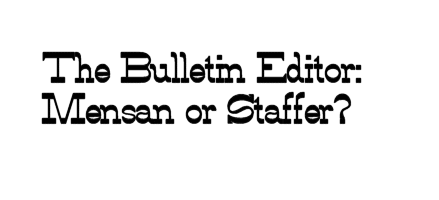

A few years ago, after the untimely death of Bulletin editor Marjorie Mandelblatt, the Bulletin editorship was abruptly changed. Formerly a freelance contract position filled by a Mensan, it became a staff job in the National Office. Mensa policy prohibits members from holding staff jobs. Much member discussion erupted on e-mail lists and elsewhere — most of it after the change was a fait accompli, rushed through by the AMC as an "emergency" move. Fast forward to 2003; once again the editorship becomes a subject of (mostly post-factum) discussion when a lightning-quick change of editor is made, this time by the Executive Director, with some AMC consultation.
The intent of this article is not to render an opinion, good or bad, about the talents or merits of any individual who has held the position of Bulletin editor or who may be considered for it in the future. However, the basic issue of whether the Bulletin should be edited by a Mensan or a non-Mensan, as a volunteer or for pay, is an important one; it deserves scrutiny, as the person in this position wields considerable influence on the culture and atmosphere of Mensa.
Over the history of the Bulletin, the following systems of editorship have been used:
- Mensan volunteer (unpaid) editor; this is the same system used for local chapter newsletters and for many other national Mensas' newsletters.
- Freelance contract editor paid a stipend (less than full-time wages); can be Mensan or non-Mensan (actual editors under this system were Mensans).
- National office staffer paid full-time salary; prohibited by policy from being Mensan; may have other duties in office unrelated to Bulletin; reports to Executive Director.
Some other possible systems that might be used:
- Volunteer Mensan editor-in-chief, writing the editorials and controlling the style and tone of the publication, assisted by a paid staffer (managing editor) who ensures that the work gets done in a professional way and maintains continuity if the volunteer burns out.
- Team of volunteer Mensan editors, each with specific responsibilities so that nobody's job gets too burdensome for a volunteer.
- Outsourced publication produced by a professional company specializing in organization magazines.
Some of the issues that should be considered when deciding whether the position ought to be filled by a Mensan:
- The Bulletin is central to the Mensa experience; for many members, who seldom attend Mensa events in person, the national magazine and local newsletter are their only view of the organization. Hence, it's a positive thing for the Bulletin to be produced by somebody who is part of the Mensa culture, not an outsider who might "just not get it." By this standard, a Mensan (volunteer or freelancer) is superior to a staffer, and an outsourced magazine publisher would be the worst option. Would you want your church / synagogue / mosque bulletin to be outsourced to a staff without a single Christian / Jew / Muslim?
- The Bulletin editor is in a position that is likely to attract controversy and criticism; if it doesn't, that means that the publication is much too bland (and may come under criticism for that!). However, various reasons (both real and perceived) act to squelch potential criticism of a staffer editor. At times when a change of editor was in progress, members have been told in online fora that any issues regarding the qualifications of past, present and future individuals serving in or being considered for the editorship are "none of your business." Personnel issues, such members are informed, are a confidential matter decided by the Executive Director and a very limited subset of Mensa officers (not even including all AMC members).
- Additionally, an ASIE exists prohibiting "ridicule and calumny" aimed at the National Office staff. On its face, that interdiction is reasonable. (Personal attacks are never a positive contribution to any discussion, and attacks on non-Mensan staff are particularly bad because, not being Mensans themselves, they can't defend themselves on Mensa political fora.) But that ASIE is sometimes interpreted by those in power as banning any criticism of the National Office or any staffer there. (One of the many charges against Judy Dosse a decade ago was that she had actually said it was a "crapshoot" getting anything through the National Office.) Such a blanket ban on criticism may be defensible if the National Office is composed only of clerical workers; whether they're shuffling their papers correctly is a matter to be overseen by the Executive Director, not grist for the Mensa political mill. The Bulletin editor, however, is a much more visible and influential position, and one that should not be exempt from criticism by the "common" members.
- On the other hand, producing the national magazine is a big, demanding job, for which it is difficult to find and keep qualified volunteers. Making this job a staff function arguably gives the publication more stability and professionalism.
- However, some members are less interested in having a slick, professional, coffee-table-style publication than in having one that reflects what it means to be a Mensan. Many of the local, volunteer-edited newsletters do just this; the occasional lack of "professionalism" means that some don't look quite as nice as they might, but they have character that's not found in a bland, corporate product.
These are just a few of the many issues deserving discussion regarding the nature of the Bulletin editorship, but they were given short shrift because of the way the change was accomplished.
One might also ask whether the ban on staffers' being Mensans is a good idea at all, now that such things as the Bulletin and the Website are produced by staff. In many ways, the staff seems to be a distinct organization with its own culture and mindset, separate from volunteer-driven Mensa. The National Office staff even has its own Internet domain name, americanmensa.org, which was adopted for staff-related e-mail addresses instead of a logical subdomain within mensa.org, like the ones that other Mensa-related entities use.
Immediate solutions may not exist for these issues, but they need to be examined thoroughly — by the "common" members as well as our leaders.